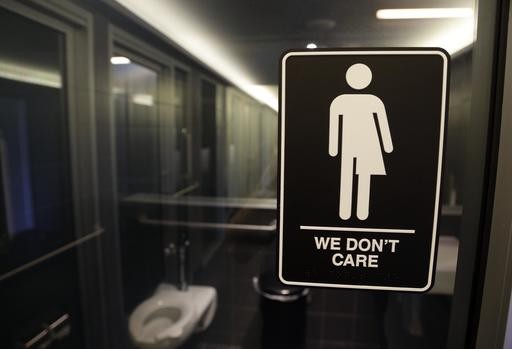Popular Reads
Top Results
Can't find what you're looking for?
View all search resultsPopular Reads
Top Results
Can't find what you're looking for?
View all search results'Folks back home' have varying views on N. Carolina LGBT law
Change text size
Gift Premium Articles
to Anyone
I
n defending a law limiting protections for LGBT people, North Carolina's powerful Republican Senate leader recently said that "folks back home" couldn't understand the outcry that's included loud demonstrations, and dozens of arrests, over the law.
Both Sen. Phil Berger and House Speaker Tim Moore come from conservative districts where recent interviews with residents indicate they are both getting high marks for their leadership, if not for every provision of the wide-ranging law.
Mowing his lawn in Eden, where Berger lives, Jerry Davis said Thursday that it's "common sense" to require people to use the bathroom corresponding to the sex on their birth certificate, as the law does.
But the 65-year-old gym owner doesn't agree with part of the law that takes away the right to use state law to sue over workplace discrimination.
"It seems like it's anti-worker," said Davis, a lifelong Eden resident who attends the same Baptist church as Berger. "It's too much wrapped into one law."
Davis said that while the law allows private businesses to set their own restroom policies, he hasn't instituted one at his gym yet. But he added: "I'm not going to let a man go in the ladies' restroom."
The law also excludes sexual orientation and gender identity from statewide discrimination protections and pre-empts local governments from enacting anti-discrimination measures that would go further.
Opponents, including the Obama administration, say the law is discriminatory and that there's no evidence to back up conservative claims that, without the law, predators would dress as the opposite sex to target women and children in restrooms. Scores of business leaders around the country have signed a letter seeking the law's repeal, and high-profile entertainers including Bruce Springsteen and Pearl Jam have canceled concerts because of it. The NBA has threatened to move the 2017 All-Star Game from Charlotte if the law isn't repealed.
Berger's remark about "folks back home" is part of a narrative by top Republican leaders who say they're protecting the restroom privacy of their supporters, many of whom live in North Carolina's small towns, against challenges from left-leaning advocacy groups in big cities and outside the state.
"My job is to listen to the people who elected us to represent them," Berger said last month on the eve of the legislative session while fielding reporters' questions about the law.
Days later, after more than 50 protesters were arrested at the General Assembly, Berger added: "When I talk to folks back home, they have a real hard time understanding why people can't be more civil."
The fight over the law escalated this week when dueling lawsuits were filed by the federal Department of Justice, Republican Gov. Pat McCrory and the legislative leaders. The federal government argues the state legislation violates multiple federal laws including part of the 1964 Civil Rights act known as Title VII.
Berger and Moore's lawsuit, filed separately from the governor's, called the Justice Department's stance "absurd and dangerous," adding that the court should take their side "to protect the sovereignty of North Carolina's people to set public policy on sensitive and controversial matters of bodily privacy and security."
Moore's law office is surrounded by two blocks of specialty shops and restaurants in downtown Kings Mountain, a town of about 10,000 people 30 miles or so west of Charlotte.
In an interview not far from Moore's office, Perry Huskey called the legislator a good Christian man who stands up for what he believes.
"I'm all for him. I'll back him 110 percent," said Huskey, a maintenance worker for a fast-food chain.
Moore is standing up for all the women in his family, Huskey said.
"I don't want a man walking in the restroom with them," Huskey said. "I don't care what he's dressed like. God don't make mistakes. The Y chromosome is still there. You can't change that."
Back in Eden, a town of about 15,000 near the Virginia state line, gun shop owner Barry Carter said he's heard only positive reviews in his circle of friends for Berger, who's also a lawyer.
"I'm in complete agreement with him," said Carter, a 62-year-old former police officer who has lived in the town all his life. "Sometimes you just have to take a stand for something."
Carter said talk of the law peaked several weeks ago and has begun to die down in the town where a carpet manufacturer is one of the biggest employers. Other textile plants that once powered the area's economy have shuttered.
Across the street from the gun shop, Kysha Williamson said he was "up in the air" about the law's bathroom provision during an interview outside of the shoe store he owns with his mother.
"You don't want people in danger," said Williamson, a 21-year-old Bernie Sanders supporter who grew up in Eden. "A separate bathroom wouldn't hurt and is probably the safest way to go."
On the porch of his two-story home north of downtown, 63-year-old James McKinney spoke guardedly about the law. He said he didn't agree with limiting the ability to sue in state court for workplace discrimination or a provision restricting local government's ability to raise minimum wage, but he declined to discuss the measures on LGBT rights.
It would suit him for lawmakers to focus their energy elsewhere, such as boosting the economies of small towns like his.
"There are other issues that need to be addressed," he said. "We need jobs that pay a decent wage, have benefits and have health insurance."
___
Foreman reported from Kings Mountain, North Carolina.










